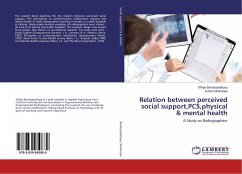
Acculturation and Perceived Discrimination among South Asian Youth
Versandkostenfrei!
Versandfertig in 6-10 Tagen
47,99 €
inkl. MwSt.

PAYBACK Punkte
24 °P sammeln!
Acculturation theories have recently been updated; perceived discrimination is now thought to influence the relationship between acculturation style and mental health. This study tested the hypothesis, along with gender differences in acculturation, perceived discrimination, and perceived discrimination as a moderator in the acculturation-distress relationship. It was thought that differences in gender role expectations for South Asian males and females would suggest possible differences in acculturation. It was also predicted that differential gender based cultural stereotypes would suggest d...
Acculturation theories have recently been updated; perceived discrimination is now thought to influence the relationship between acculturation style and mental health. This study tested the hypothesis, along with gender differences in acculturation, perceived discrimination, and perceived discrimination as a moderator in the acculturation-distress relationship. It was thought that differences in gender role expectations for South Asian males and females would suggest possible differences in acculturation. It was also predicted that differential gender based cultural stereotypes would suggest differences in perceived discrimination and its role in the acculturation-distress relationship for South Asian males versus females. The results of the study found a moderate and significant direct relationship between perceived discrimination and psychological distress. Current acculturation theories may need revision in light of these findings. Therapists working with South Asian clients should also consider the role discrimination can play in impacting mental health, instead of focusing exclusively on acculturation difficulties.












